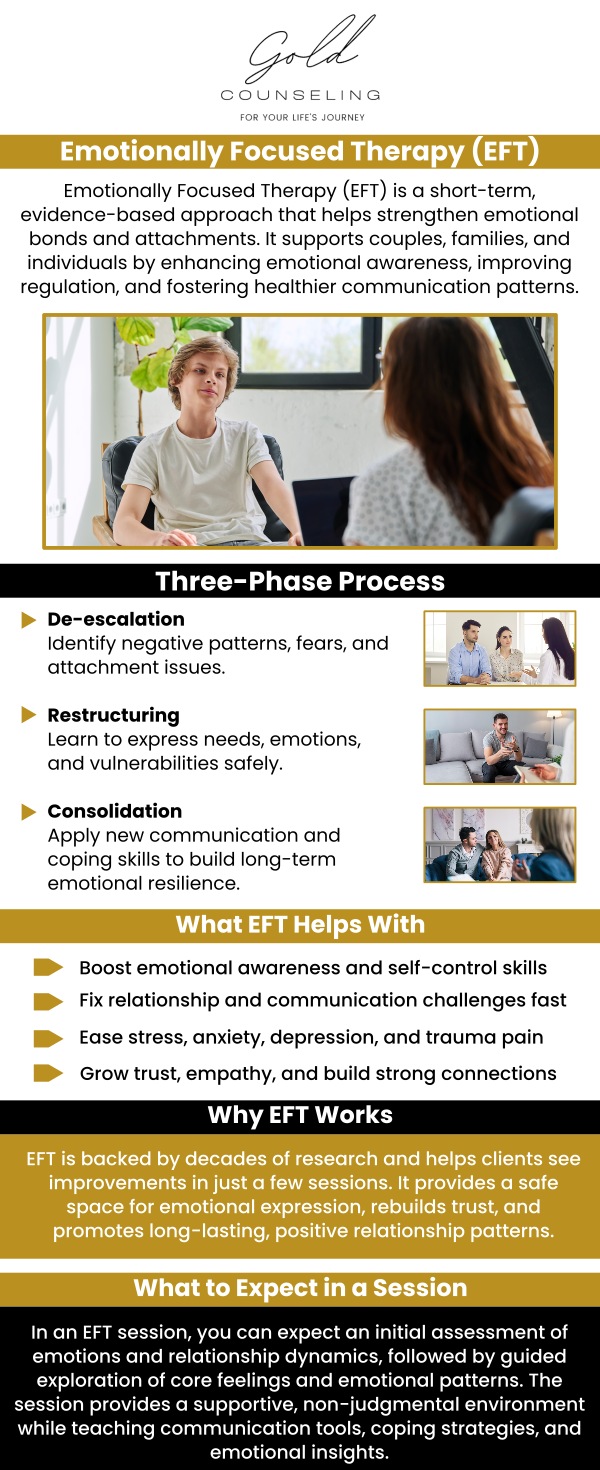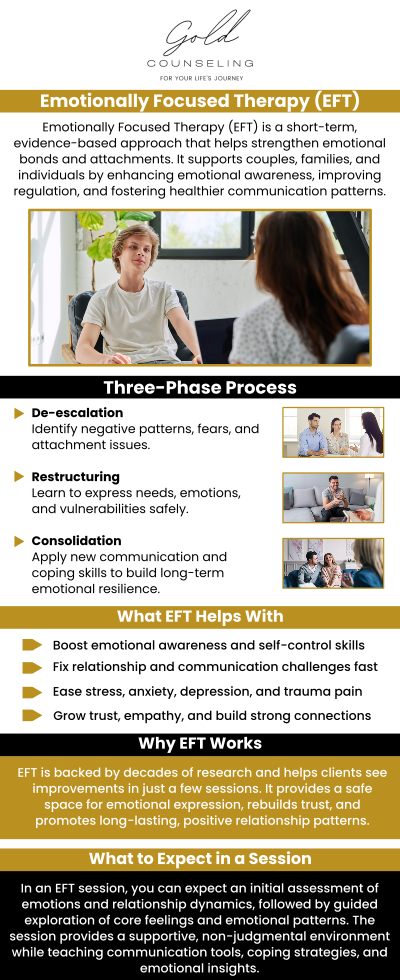Emotionally Focused Therapy (EFT) Q&A
Through better relationship management, Emotionally Focused Therapy, or EFT, assists clients in realizing their attachments to others. The American Psychological Association recognizes this strategy as having good evidence supporting its effectiveness. For more information, contact us or book an appointment online. We have convenient locations to serve you in Riverdale UT, Kaysville UT, Draper UT, and St. George, UT.




Table of Contents:
What is emotionally focused therapy (EFT)?
What are the three stages of treatment in EFT therapy?
What is the success rate of EFT therapy?
How long does it take for EFT therapy to work?
Emotion-focused therapy, or EFT, is an evidence-based, short-term therapy with a focus on improving attachment and strengthening the bond within adult relationships. This therapy approach was developed in the 1980s for couples therapy (EFCT) and is based on research on love as an attachment bond. Additionally, EFT can also be used for family therapy (EFFT) to strengthen communication and secure an emotional bond. In some cases, a mental health specialist will introduce this approach in individual therapy (EFIT), particularly to enhance emotional self-awareness and decrease the negative effects of certain emotions.
Some of the key skills learned during emotion-focused therapy are acknowledging and accepting difficult feelings, better regulating emotions, and learning how to transform negative emotions to avoid harmful behaviors. Throughout therapy, participants learn how to evaluate and regulate emotions as well as adopt healthy coping strategies to mitigate conflict and strengthen the relationship.
The three stages of treatment during emotion-focused therapy are:
• De-escalation – In this initial stage, the focus is to identify key concerns, negative patterns of behavior, and fears. The relationship problems are discussed, and attachment styles are determined. This helps end the cycle of distress and supports the transition to the next stage.
• Restructuring – During the restructuring phase, individuals learn strategies to express their emotions, needs, and desires, while also practicing acceptance toward themselves, their family, or their partner. Though initial changes can be uncomfortable, they are necessary for fostering a healthier and stronger connection.
• Consolidation – The last part of the EFT process is learning how to apply new coping skills to real-life situations to achieve better problem-solving and enhanced emotional intelligence. At this stage, problems that brought individuals, couples, or families to therapy can be addressed with constructive approaches.
Through these three stages, our team offers EFT that helps participants build stronger and longer-lasting relationships while simultaneously enhancing their mental health and overall quality of life.
Clinical research has demonstrated that about 70-75% of couples participating in EFT move away from distress after a series of sessions with a specialist. In about 10 to 12 sessions, 90% of couples experienced significant improvement and growth within the relationship. Improvement can mean enhanced relationship satisfaction, increased emotional intelligence, improved problem-solving skills, or simply a stronger bond. Compared to other relationship counseling techniques, EFT stands out as the most effective option. It is evidence-based and has earned the approval of the American Psychological Association.
If you want to change negative communication patterns and work on enhancing your problem-solving skills, EFT can be incorporated into your couples, family, or individual therapy sessions. This technique will help you approach your emotions in a healthy way that fosters connection, growth, and happiness. Overall, emotion-focused therapy is a highly effective approach that is backed by decades of research and consistent success.
One of the key advantages of EFT is that it does not take long to start working. This technique offers benefits in as little as 8 sessions. As each case is different, some couples, families, or individuals will require more sessions to achieve their desired results, with the average being 12 to 20 weeks.
Compared with other types of therapy, the EFT approach is considered short-term. The exact number of sessions needed in your case depends on the complexity of the issues you are working through. It’s crucial to stay committed to the process to experience personal growth, emotional awareness, trauma processing, and various other benefits.
Emotion-focused therapy is considered successful once increased emotional awareness and regulation occur. By practicing techniques learned during therapy to enhance your emotional intelligence, you can enjoy significant improvements quite quickly. If you think EFT is an approach that can benefit you, your relationship, or your family, the experts at Gold Counseling can answer your questions and help you get started. For more information, contact us or book an appointment online. We serve patients from Riverdale UT, Washington Terrace UT, Clinton UT, Kaysville UT, Clearfield UT, Farmington UT, Draper UT, Riverton UT, Sandy UT, St. George, UT, Bloomington UT, Santa Clara UT, and surrounding areas.
Check Out Our 5 Star Reviews



Additional Services You May Need
▸ Relationship Counselling
▸ Couples Counselling
▸ Individual Therapy
▸ EMDR Therapy
▸ Spiritual Healing
▸ Disordered Eating
▸ LGBTQIA+ Therapy
▸ Group Psychotherapy
▸ Life Coaching Therapist
▸ Depression Treatment
▸ Mental Health Clinic
▸ Life Transition Therapy
▸ Telehealth Counseling
▸ Cognitive Behavioral Therapy (CBT)
▸ Dialectic Behavioral Therapy (DBT)


